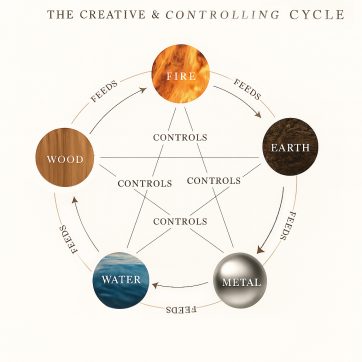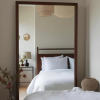
5 Common Feng Shui Mistakes in Mallorca Homes (And How to Fix Them)
In Feng Shui, small details hold big consequences: a misplaced mirror, a cluttered entry, or a dark hallway can quietly drain health, harmony, and prosperity.
– Rosanna
5 common mistakes:
1. The Cluttered Entryway – The Chaotic Welcome
In Feng Shui, the entrance of your home is known as the “mouth of Chi” – the place where energy, opportunities, and even supportive people find their way to you. When this area is cluttered, dark, or unwelcoming, it symbolically says: there’s no room for anything new to enter your life.
Think of the front door as a first impression: if guests or clients struggle to find it, if it feels cramped, or if it’s piled with shoes and bags, the flow of Chi is obstructed.
What this means in practice:
-
A messy or narrow entrance often corresponds to missed opportunities or stagnant personal and professional growth.
-
Poor lighting here can contribute to low motivation or a sense of being “stuck.”
-
Broken locks, squeaky hinges, or peeling paint may translate into unnecessary obstacles in daily life.
How to correct it:
-
Clear the space – Keep the entrance free from clutter. Even a small hallway can feel open if it’s orderly.
-
Invite light – Add a soft lamp, a lantern, or warm-toned bulbs to create a welcoming glow. Natural light is even better if possible.
-
Maintain your door – Ensure it opens fully without resistance. A well-kept door suggests life flows smoothly toward you.
-
Add intention – A fresh doormat, a vase of flowers, or an uplifting piece of art can all signal openness to abundance.
When you approach your entrance, ask yourself:
Does this space feel like it’s welcoming me into possibility, or shutting me out?
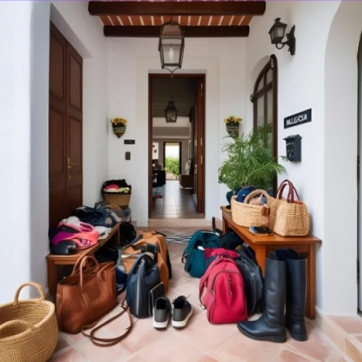
2. Mirrors Facing the Bed
The bedroom is meant to be a Yin sanctuary – soft, restful, and restorative. It’s the space where your body and spirit recharge. A mirror that reflects the bed disrupts this calm atmosphere by introducing Yang activity into a place that should encourage stillness.
From a Feng Shui perspective, a mirror directly facing the bed can create the feeling of a “third presence” in the relationship, symbolically inviting intrusion or disharmony. For those sleeping alone, it may foster restlessness or even a subtle sense of being observed, which can disturb sleep on a subconscious level.
What this means in practice:
-
Restless or broken sleep, difficulty winding down at night.
-
A sense of unease in the room, even if everything else feels serene.
-
In relationships, it may amplify tension or attract unwanted “outside energy.”
How to correct it:
-
Reposition when possible – Move the mirror so it doesn’t directly face the bed. Ideally, keep reflective surfaces away from the resting zone.
-
Cover it at night – If the mirror is built-in or can’t be relocated (like on a wardrobe), use a fabric covering or screen during sleeping hours. This small ritual already shifts the energy.
-
Soften the reflection – A decorative curtain, frosted film, or even plants can diffuse the reflective surface without eliminating it completely.
-
Choose alternatives – In bedrooms, artwork, soft textiles, or natural elements are better for creating harmony than mirrors.
Extra note for Mallorca homes: many bedrooms feature large built-in wardrobes with mirrored doors.
While practical, they may compromise sleep quality. A simple solution is to install sliding panels, bamboo blinds, or even stylish linen coverings to keep the room energetically calm without losing functionality.
See my article about the common mistakes in the bedroom here.
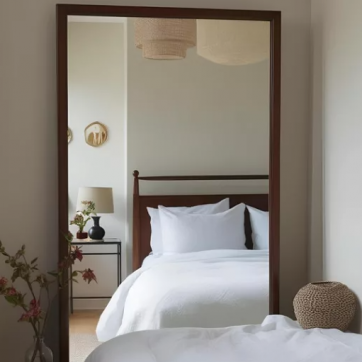
3. Sofa with Its Back to the Door
The living room is where families gather, guests are welcomed, and social energy circulates. In Feng Shui, the sofa represents stability and support. When it is placed with its back to the door, the nervous system never fully relaxes: you can’t see who is coming in, so on a subconscious level, the body remains alert.
This constant vigilance may not seem obvious, but over time it contributes to feelings of unease, tension, or even difficulty in enjoying true rest and connection in the space.
What this means in practice:
-
Difficulty relaxing in the living room, even when the atmosphere should feel calm.
-
Guests may come and go quickly, as if they cannot “settle in.”
-
Symbolically, opportunities may arrive but pass by unnoticed, because the seating arrangement literally turns its back on them.
How to correct it:
-
Reposition when possible – Ideally, the sofa should face the entrance or at least allow a clear view of the main door into the room.
-
Create support – If moving the sofa isn’t an option, place a console table, a row of plants, or a low bookcase behind it. This acts as a protective “mountain” and restores a sense of security.
-
Use reflective solutions – A low mirror on the wall, angled to show the entrance, can also provide subconscious reassurance without needing to change the layout completely.
-
Balance with décor – Cushions, soft textiles, or warm lighting around the sofa reinforce its role as a supportive, inviting anchor of the room.
Mallorca note: many Mediterranean homes have open-plan living rooms where the main entrance and terrace doors align. While this creates a breezy, light-filled atmosphere, it often leaves sofas “floating” in the middle.
Strategic placement of a console table with natural wood or woven materials (rattan, wicker) both honors local style and provides the energetic backing the sofa needs.
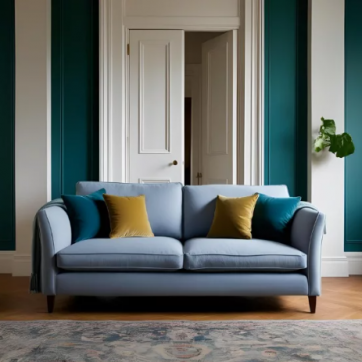
4. Long, Dark Hallways
In Feng Shui, hallways act like arteries of the home, carrying Chi from one room to another. When they are long, narrow, and poorly lit—as often seen in historic Mallorcan fincas—the energy tends to rush through too quickly or stagnate in shadowy corners. Both extremes can leave residents feeling unsettled, as if balance and harmony are missing.
Instead of being a neutral passage, the hallway becomes a place where life force is either drained or trapped.
What this means in practice:
-
A sense of being rushed or stressed when moving through the house.
-
Difficulty in creating a smooth flow between private and social spaces.
-
Symbolically, opportunities or good fortune may “speed past” without anchoring in your life.
How to correct it:
-
Bring in warm light – Use wall sconces, soft lamps, or hidden LED strips to create an inviting glow. A well-lit path slows down the Chi and makes movement feel comfortable.
-
Soften with texture – Place runners, soft rugs, or natural fiber mats (like jute or sisal) to ground the space and absorb excess speed.
-
Guide the energy – Artwork with calming themes, landscapes, or gentle curves can encourage the Chi to flow forward with grace instead of rushing.
-
Break the tunnel effect – A small console with flowers, a plant, or a decorative niche midway can create a pause, giving Chi (and people) a reason to linger.
Mallorca note: traditional stone walls often make hallways feel heavier and darker. By balancing them with mirrors that reflect light (but not directly facing each other, to avoid creating a “racing” effect), or by adding Mediterranean-style sconces in warm terracotta or brass tones, you transform these corridors into pleasant, life-affirming transitions.
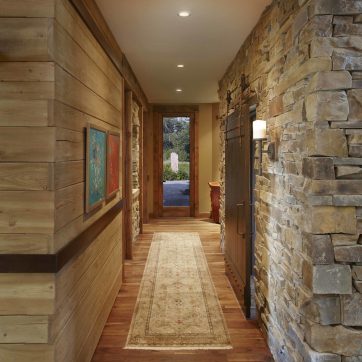
5. Stove Beside the Sink
In Feng Shui, the kitchen is considered the heart of prosperity and health. Here, two powerful elements coexist: Water (sink) and Fire (stove). When these opposites are placed side by side, they clash. Symbolically, this conflict can lead to arguments in the household, financial instability, or a sense of inner tension.
The interaction of Water extinguishing Fire—or Fire evaporating Water—creates an energetic disharmony that subtly affects both relationships and abundance.
What this means in practice:
-
Family members may experience more frequent disagreements or mood swings.
-
Efforts to save or grow wealth may feel undermined.
-
A general lack of inspiration when cooking, as if the kitchen does not fully support nourishment.
How to correct it:
-
Introduce Wood as a mediator – Place a wooden cutting board, bamboo tray, or even a pot of fresh basil between the stove and the sink. In the elemental cycle, Wood harmonizes Water and Fire, creating balance.
-
Use symbolic separation – If the layout doesn’t allow space for Wood, a strip of warm-colored tiles, a rug, or decorative accessories can visually and energetically “divide” the two.
-
Enhance Fire elsewhere – Keep the stove area well lit, and add touches of red, orange, or terracotta to reinforce the vitality of the Fire element.
-
Keep Water calm – Ensure the sink doesn’t leak or drip. Flowing water represents wealth, and letting it escape unchecked can drain resources.
Mallorca note: many kitchens in Mediterranean homes are compact, with sink and stove often side by side to save space. Here, small interventions like a handcrafted olive-wood board, terracotta jars, or herbs in clay pots not only restore elemental harmony but also celebrate the local aesthetic.
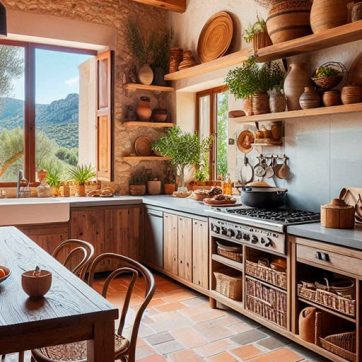
When you clear space, you don’t just tidy your home—you make room for opportunities to find you.– Rosanna
Feng Shui is not about perfection; it’s about flow. When energy moves freely, so does life.
Want Expert Support?
As a Feng Shui consultant based in Mallorca, I offer in-person consultations for homes and businesses across the island and online sessions worldwide.
Share


